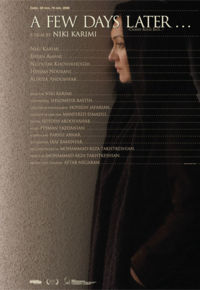 |
A Few Days Later… (2006, Dir. Niki Karimi)
This is my lifetime’s work.
It’s been about a decade since Abbas Kiarostami put Iran cinema on the world map with his “earthquake” trilogy and A Taste of Cherry, and it’s interesting to see how much things have changed and stayed the same with this film, which stars and is directed by Niki Karimi, who was an assistant director to Kiarostami on some of his later projects. It starts off as a Kiarostami film might — a car driving on a lonely mountain road at night. In the car is Shahrzad (Karimi), who receives a cryptic message from a man on her phone, and then without further explanation, it is the next morning, and we follow Shahrzad to her job as a modern-day graphic designer in Tehran. Her first assignment of the day is to design the cover for a famous female author’s collected writings; even though we never see the author again, her plea for Shahrzad to do a good job, as the book is her “lifetime’s work,” are a hint to the direction this film will take.
Shahrzad’s own work is never done, it turns out. At first she seems confident, self-possessed, secure, but as the film proceeds we come to understand her problems, as she’s burdened by a mix of old-world and new-world concerns: a sick father who needs her attention, a handicapped son who is about to get kicked out of a day care center because he’s too “old,” an estranged husband (the mysterious voice on the answering machine) who is desperate for a reconciliation, a male boss and picky clients who doesn’t appreciate her efforts, builders who are taking way too long to renovate her home, an annoying neighbor who keeps parking in her space with his SUV…
This is a feminine, and feminist movie — men are mostly absent, and the ones who are present tend to be bossy, annoying, or ailing. But even as Shahrzad tries her best to forget her everyday pressures with the help of a photographer girlfriend, it’s clear that the perpetual frown on her face is her response to being forced to make her way in a patriarchal society. While cars in Kiarostami films symbolize freedom, connection with others, and the bridging of gaps, here they’re just brief respites, as the only times Shahrzad can even try to relax are when she’s making the long lonely commute home from work, or when she’s driving with her girlfriend to the sounds of the latest Iranian pop song…and even then she remains somber, exhausted, her misery only slightly alleviated.
So a feel-good movie this ain’t, but it’s no weepie, either — it’s just a bracing, cool, rueful look at women’s lot in the modern world, and well done. Very well photographed, too: this is a modern Tehran we haven’t seen in many movies, a collision of lighted superhighways at night and dusty mountain roads, high-tech marketing billboards and run-down hospital buildings. But it all starts and ends with Karimi, who turns out to be quite an actress for a director — her character’s range of expression is limited, but within that range we read uncertainty, rage, resignation, despair. The movie ends with a close-up on her stunned face, a storm on the way, and it suggests that what we’ve seen is just a prelude; the real story will happen when she decides how she confronts her predicaments. It’s a nice analogue for Iranian cinema, and its unknown roads ahead as the country continues to modernize.